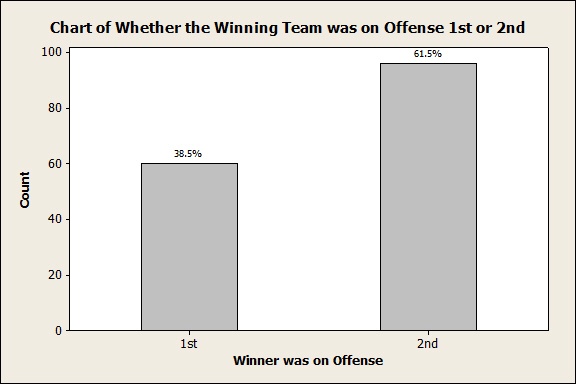I've been reflecting on my reaction to the "touchdown wins" rule.
It is very true that the Patriots have now twice used that rule to their advantage in the playoffs (plus once when it was just a field goal needed).
But in the game right before the team that had the ball first in the overtime lost, rather than winning.
It's not the coin flip that determined the winner, but the play of the teams after the coin flip, for all the the coin flip provides an advantage.
It's not a huge advantage. Contrary to the 55% figure usually cited, it's actually a hair below 52% --> 45/87. 42.5% of the time they lose.
But giving both sides a chance at the ball doesn't actually seem to make things even, again! It merely changes the result to be tilted toward the second team to get the ball, based on college stats.
I kind of like one of the proposals from the Quanbeck brothers, roughly equivalent to "I get to cut the cake, but you get first choice of which piece to take." One team would choose the field position to open overtime, while the other team chooses whether to play offense or defense from that spot.
So... of those 87 overtime games, how many were determined on a touchdown on the first sequence, anyway?
I understand your position.
I would rather both sides get to have an offensive series. Just seems the American way to me.
Personally I like the way the NCAA handles their OTs. I would rather they start on their own 45 though and earn that FG attempt.
NCAA is where the proportion tilts to the 2nd possession - the team on defense first - wins as disproportionately as the first possesion touchdown wins in the NFL. And their sample size is huge, by comparison - over 500 games, I think.
What have you gained?
Fairness?
But it's not any more fair. It just changes which team has the balance tilted in their favor.
The first team's possession determines what the second team's goals minimum goal must be.
1st = 0
2nd needs anything
1st = 3
2nd needs 7 to win, but can settle for 3.
1st = 6 or 7,
2nd needs a TD.
That's why the imbalance in college is so worth noting. Fairness is not achieved:

(2008-2013, a mere 156 overtime games)
It looks, however, as if there may be a bigger factor: when did the last team to score score during regulation.
If they scored less than two minutes before the end of regulation, there was no appreciable difference. If they scored more than two minutes before, they won 56% of the time.
But wait! There's more...
If they scored less than 30 seconds before the end of regulation, they
lost 59% of the time!
If they scored more than 30 seconds before the end of regulation, they
won 58% of the time.
That sounds like a far bigger factor than who got the ball first, but I would love to see that broken down further. And I am curious how it extends to the NFL, not just the NCAA.
